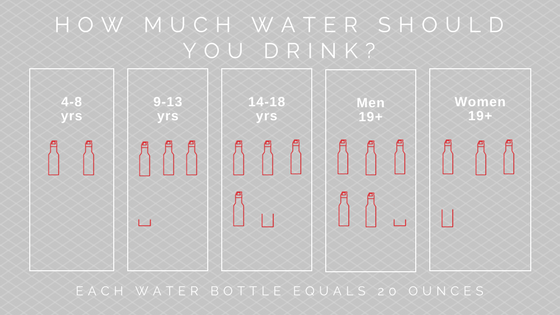
How Much Water Should You Drink to Stay Properly Hydrated?
These are the current water recommendations according to age and gender:
Kids 4-8 Years
40 ounces
Children 9-13 Years
56-64 ounces
Teenagers 14 – 18
64-88 ounces
Men 19 and Older
104 ounces
Women 19 and Older
72 ounces
But remember, this does not take into account exercise or extreme heat. The more the body sweats, the more water it will need to continue to stay hydrated.
Don’t get overwhelmed!
While those numbers may seem very large, it helps to remember that approximately 20% of our water intake each day comes from foods that we eat. Foods like watermelon, cucumbers, bell peppers, and more contain a lot of water themselves, making them great snacks on the days you just don’t feel like drinking a ton.
Why Do We Need So Much Water?
Water plays a number of big roles in the body, which makes it a very important addition to our diet.
Water helps:
- Keep the body at a normal temperature
- Lubricate and cushion joints
- Protect the spine and vital tissues
- Eliminate waste products
- Keep the skin looking healthy
- Manage a healthy weight
Dehydration is a Problem
Not getting enough water not only deprives the body of the necessary element to do the items mentioned above, it can also lead to bigger and sometimes scarier problems.
Dehydration can cause:
- Constipation
- Kidney stones
- Overheating, which can turn into heat stroke
- A need for IV hydration
- Confusion and the inability to think clearly
- Moodiness
- Vomiting
- Muscle weakness and cramps
- It can even put the body into shock
Water plays a vital role in the body, helping it function to the best of its ability. Keep a water bottle with you throughout the day and be sure to get those ounces in however you can.
The information provided is for general interest only and should not be misconstrued as a diagnosis, prognosis or treatment recommendation. This information does not in any way constitute the practice of medicine, or any other health care profession. Readers are directed to consult their health care provider regarding their specific health situation. Marque Medical is not liable for any action taken by a reader based upon this information.

Favorite Platform

New Content






